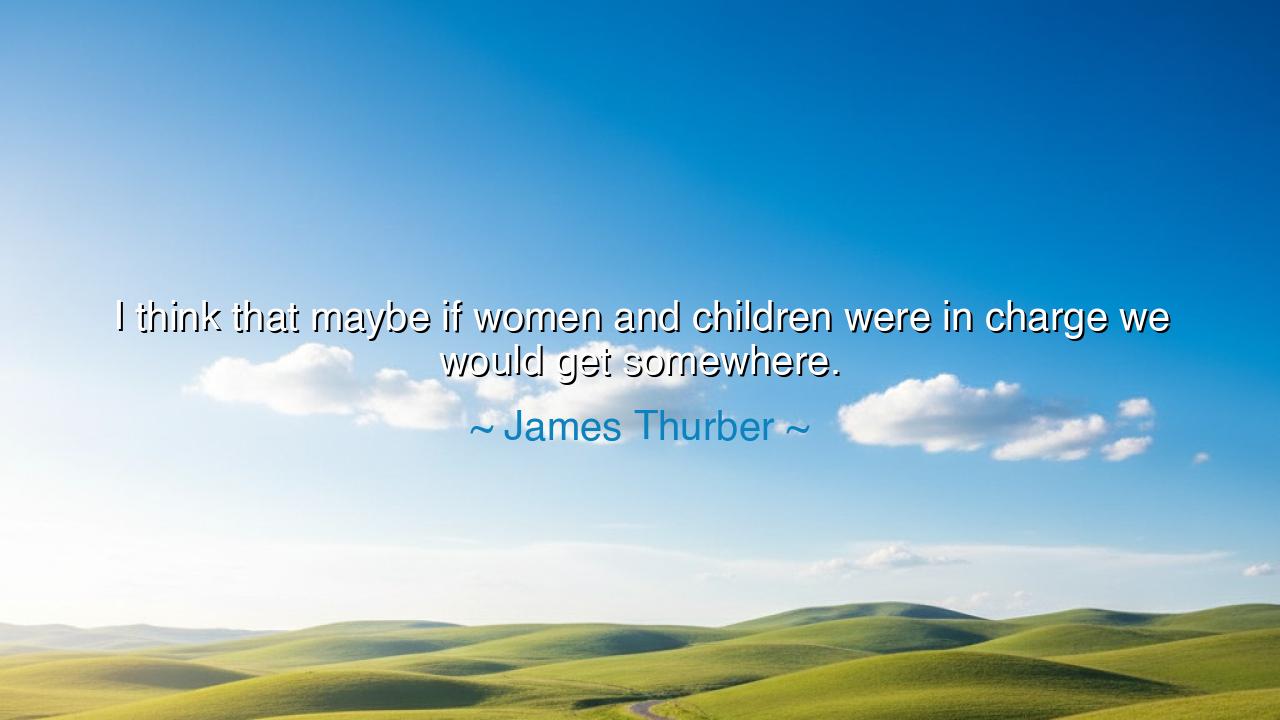
I think that maybe if women and children were in charge we would






Hear the voice of James Thurber, sharp observer of life’s follies, who declared: “I think that maybe if women and children were in charge we would get somewhere.” Though the words sparkle with wit, they shine also with deep wisdom. For in them lies a critique of the long history of male-dominated power, which has so often bent itself toward conflict, ambition, and pride. Thurber dares us to imagine a world where the gentleness of women and the innocence of children might guide us, where compassion would replace cruelty, and where the vision of life, not death, would be the ruling principle.
The origin of this saying lies in Thurber’s long career as a writer and humorist, a man who saw with keen clarity the absurdities of human behavior. In the early to mid-20th century, as the world staggered through two devastating wars, his words echoed the disillusionment many felt toward traditional systems of power. Men had ruled with armies and industry, and yet left the earth scarred and bloodied. Thurber, with a mixture of irony and longing, suggested that those too often dismissed—women and children—might carry a vision of life unclouded by conquest, and thus might guide us toward peace and renewal.
History gives us glimpses of this truth. Consider the women of ancient Sparta, who though not warriors themselves, raised their sons to be courageous and demanded integrity of their men. Their strength was not found in swords, but in shaping the spirit of a nation. Or think of Malala Yousafzai, a child when she first stood against oppression, whose voice shook the halls of power more deeply than many governments. In her youth was clarity; in her simplicity was strength. Thus, Thurber’s vision is not fantasy but rooted in the real power that women and children have wielded when the world dared to listen.
The deeper meaning of his words is this: women embody the wisdom of nurture, and children embody the purity of imagination. These are qualities the world of politics too often lacks. The masculine hunger for conquest has built empires but also destroyed them. The tender strength of women, who bear life and care for its flourishing, offers another way. The innocence of children, uncorrupted by greed or hatred, can remind humanity of its higher ideals. If these voices led us, perhaps the path would bend not toward destruction but toward harmony.
The lesson for us is profound: true leadership is not always found in the loudest, the strongest, or the most aggressive. It may be found in the qualities we too often dismiss as weakness: kindness, imagination, innocence, compassion. To allow such qualities to guide society is to reimagine power itself—not as domination, but as stewardship; not as control, but as care.
To the youth, I say: never believe your voice is too small to matter. Your dreams may hold the seeds of the future. To women, I say: do not underestimate the power of your wisdom, for it can steady the world when men falter. To the leaders of nations, I say: listen not only to generals and bankers, but also to mothers and children, for in their words lies the conscience of humanity.
Practical action lies before us: honor the perspectives of those who have been excluded from leadership. In your homes, your communities, your governments, invite the voices of women and children to be heard. Let decisions be guided not only by profit or power, but by compassion and imagination. When faced with conflict, ask not only, “How do we win?” but also, “How do we preserve life?”
Thus James Thurber’s words, though wrapped in humor, remain a beacon of wisdom. “If women and children were in charge we would get somewhere.” Perhaps not to empires or conquests, but to something greater: to peace, to justice, to a world that remembers what it means to live. Let us then learn to walk by their wisdom, that we may indeed get somewhere worth going.






MLMy Le
Thurber's quote is intriguing, as it suggests that leadership could be more effective if it were driven by more empathetic and community-focused values. But I wonder, would the world really be better off under such leadership, or are there challenges and complexities that come with leadership that empathy alone can’t solve? How do we balance compassion with practical decision-making in leadership roles?
LADao Lan Anh
This quote challenges the current power dynamics, which often place men in leadership roles. I agree that women and children bring important qualities like emotional intelligence and creativity to the table. But how would the existing power structures respond to such a shift? Would the world be ready to embrace this type of leadership, or would there be backlash against it?
UGUser Google
I like the sentiment behind this quote, as it highlights the importance of leadership that is more compassionate and focused on others' well-being. However, it raises a question: is the ability to lead purely about empathy and care, or does it also require pragmatic decision-making, toughness, and experience? Could a world led by women and children really function without those qualities too?
Nnguyenphanky
Thurber’s quote seems to imply that leadership under women and children might be more empathetic and forward-thinking, which could indeed lead to positive changes. But is it too idealistic to assume that such leadership would automatically be better? What role do external factors like societal norms, resources, and cooperation play in determining whether this approach would succeed?
SLDao si luat
This quote is interesting because it challenges the traditional structures of power. Women and children often bring unique perspectives to decision-making, driven by empathy, nurturing, and a focus on the collective good. But can they truly change things if the system itself is designed to favor certain groups? Would these shifts actually lead to more progress, or would they face resistance from entrenched power structures?